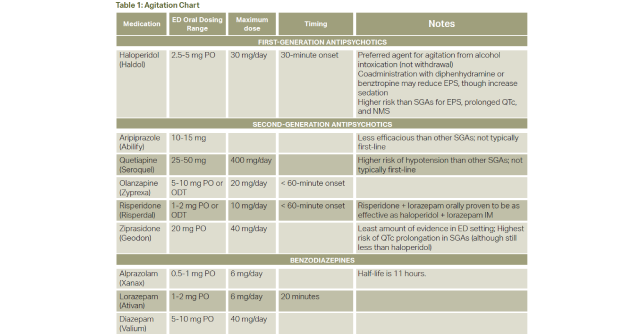
Finally, once patients with mild to moderate agitation are stabilized and ready for discharge, the ED physician should consider re-starting outpatient medications. While the initiation of a new outpatient antipsychotic regimen is beyond the scope for most ED physicians, it is certainly reasonable for ED physicians to refill or restart an existing medication regimen.
Explore This Issue
ACEP Now: Vol 42 – No 07 – July 2023 Dr. Miller is Chief Medical Officer of Vituity. Dr. Miller leads an EMPC sub-committee focused on mental health issues in the ED.
Dr. Miller is Chief Medical Officer of Vituity. Dr. Miller leads an EMPC sub-committee focused on mental health issues in the ED.
 Dr. Enguidanos is Chair of ACEP’s Emergency Medicine Practice Committee (EMPC). He is Founder/CEO of Community Based Coordination Solutions.
Dr. Enguidanos is Chair of ACEP’s Emergency Medicine Practice Committee (EMPC). He is Founder/CEO of Community Based Coordination Solutions.
 Dr. Wilson is board-certified in emergency medicine and is an associate professor (tenured) in the Departments of Emergency Medicine and Psychiatry at the University of Arkansas for Medical Sciences.
Dr. Wilson is board-certified in emergency medicine and is an associate professor (tenured) in the Departments of Emergency Medicine and Psychiatry at the University of Arkansas for Medical Sciences.
References
- American College of Emergency Physicians Clinical Policies Subcommittee on the Adult Psychiatric P, Nazarian DJ, Broder JS, et al. Clinical Policy: Critical Issues in the Diagnosis and Management of the Adult Psychiatric Patient in the Emergency Department. Ann Emerg Med. Apr 2017;69(4):480-498.
- Wilson MP, Pepper D, Currier GW, Holloman GH, Jr., Feifel D. The psychopharmacology of agitation: consensus statement of the american association for emergency psychiatry project Beta psychopharmacology workgroup. West J Emerg Med. Feb 2012;13(1):26-34.
- Schneider A, Mullinax S, Hall N, Acheson A, Oliveto AH, Wilson MP. Intramuscular medication for treatment of agitation in the emergency department: A systematic review of controlled trials. Am J Emerg Med. Aug 2021;46:193-199.
- Zun L, Wilson MP, Nordstrom K. Treatment Goal for Agitation: Sedation or Calming. Ann Emerg Med. Nov 2017;70(5):751-752.
- Richmond JS, Berlin JS, Fishkind AB, Holloman GH Jr, Zeller SL, Wilson MP, Rifai MA, Ng AT. Verbal De-escalation of the Agitated Patient: Consensus Statement of the American Association for Emergency Psychiatry Project BETA De-escalation Workgroup. West J Emerg Med. 2012 Feb;13(1):17-25.
- Mullinax S, Shokraneh F, Wilson MP, Adams CE. Oral Medication for Agitation of Psychiatric Origin: A Scoping Review of Randomized Controlled Trials. J Emerg Med. Oct 2017;53(4):524-529.
- Currier GW, Chou JC, Feifel D, et al. Acute treatment of psychotic agitation: a randomized comparison of oral treatment with risperidone and lorazepam versus intramuscular treatment with haloperidol and lorazepam. J Clin Psychiatry. Mar 2004;65(3):386-94.
- Zaman H, Sampson SJ, Beck AL, et al. Benzodiazepines for psychosis-induced aggression or agitation. Cochrane Database Syst Rev. Dec 8 2017;12(12):CD003079.
- American College of Emergency Physicians Clinical Policies Subcommittee on the Adult Psychiatric P, Nazarian DJ, Broder JS, et al. Clinical Policy: Critical Issues in the Diagnosis and Management of the Adult Psychiatric Patient in the Emergency Department. Ann Emerg Med. Apr 2017;69(4):480-498.
- Roppolo LP, Morris DW, Khan F, Downs R, Metzger J, Carder T, Wong AH, Wilson MP. Improving the management of acutely agitated patients in the emergency department through implementation of Project BETA (Best Practices in the Evaluation and Treatment of Agitation). J Am Coll Emerg Physicians Open. 2020 Jul 3;1(5):898-907.
- Wilson MP, Pepper D, Currier GW, Holloman GH Jr, Feifel D. The psychopharmacology of agitation: consensus statement of the american association for emergency psychiatry project Beta psychopharmacology workgroup. West J Emerg Med. 2012 Feb;13(1):26-34.
- Wilson MP, Chen N, Vilke GM, Castillo EM, MacDonald KS, Minassian A. Olanzapine in ED patients: differential effects on oxygenation in patients with alcohol intoxication. Am J Emerg Med. Sep 2012;30(7):1196-201.
Pages: 1 2 3 4 | Single Page




One Response to “Agitation Treatment in the Emergency Department”
July 12, 2023
John SmithI appreciate the article’s emphasis on the importance of early intervention in the treatment of agitation. Agitation can quickly escalate, so it is important to intervene early to prevent a patient from becoming more aggressive or violent.